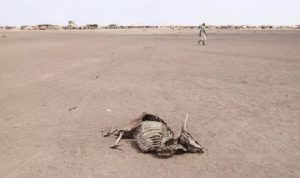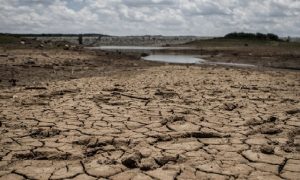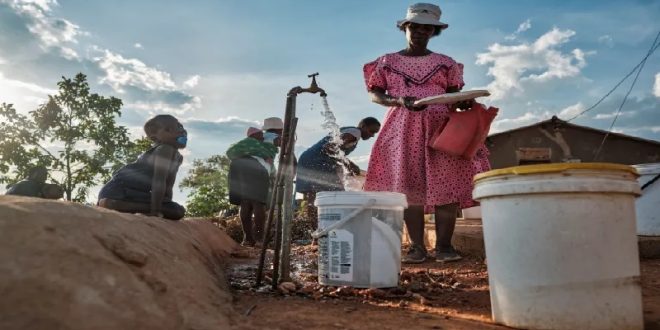18-08-2024
HARARE: Tens of millions of people in Southern Africa are suffering the effects of an El Nino-induced drought, a regional bloc has warned, with a drop in crop and livestock production causing food shortages in several countries.
Elias Magosi, executive secretary of the Southern African Development Community (SADC), said on Saturday that 17 percent of the region’s population some 68 million people are in need of assistance.
 “The 2024 rainy season has been a challenging one with most parts of the region experiencing negative effects of the El Nino phenomenon characterized by the late onset of rains,” Magosi said.
“The 2024 rainy season has been a challenging one with most parts of the region experiencing negative effects of the El Nino phenomenon characterized by the late onset of rains,” Magosi said.
His remarks come as the heads of state of the 16-nation SADC were meeting in Zimbabwe’s capital of Harare to discuss regional issues, including food security.
Zimbabwe, Malawi and Zambia are among the countries in Southern Africa most affected by malnutrition caused by the drought, which began in early 2024.
Reporting from Harare on Saturday, journalist Haru Mutasa said the SADC nation leaders were likely to be discussing how to get more funding and food aid to affected countries.
“Crops are dying, it’s a huge problem,” Mutasa said.
In early June, the United Nations World Food Program highlighted the dire effects of the drought, particularly on communities already vulnerable to food shortages.
“Rural communities we have met on the ground tell us they have never seen anything like this. They are extremely worried about their future,” said Reena Ghelani, the UN climate crisis coordinator for the El Nino response.
Southern Africa saw its driest February in 100 years, the UN said, receiving only 20 percent of the usual rainfall. Temperatures were also several degrees above average.
UN Secretary-General Antonio Guterres said late last month that extreme heat fuelled by the climate crisis was “increasingly tearing through economies, widening inequalities, undermining the Sustainable Development Goals, and killing people”.
“We know what is driving it: fossil fuel-charged, human-induced climate change. And we know it’s going to get worse; extreme heat is the new abnormal,” he said.
 Experts have warned that as the effects of climate change intensify, weather patterns are becoming more extreme with droughts, super-charged hurricanes, floods and wildfires affecting much of the globe.
Experts have warned that as the effects of climate change intensify, weather patterns are becoming more extreme with droughts, super-charged hurricanes, floods and wildfires affecting much of the globe.
The head of the United Nations has called on countries to take action to address the effects of “crippling heat”, as the world experiences record-high temperatures that have put vulnerable communities at risk.
Speaking to reporters on Thursday, Antonio Guterres said billions of people around the globe are experiencing “an extreme heat epidemic” fueled by climate change.
“Extreme heat is increasingly tearing through economies, widening inequalities, undermining the Sustainable Development Goals, and killing people,” the UN secretary-general said.
“We know what is driving it: fossil fuel-charged, human-induced climate change. And we know it’s going to get worse; extreme heat is the new abnormal.”
Guterres’s warning comes a day after the European Union’s climate monitor said the world had experienced its hottest day on record this week.
The Copernicus Climate Change Service (C3S) said on Wednesday that the global average surface air temperature on July 22 rose to 17.15 degrees Celsius (62.9 degrees Fahrenheit) or 0.06 degrees Celsius higher than the record set just a day earlier. (Int’l News Desk)
 Pressmediaofindia
Pressmediaofindia




